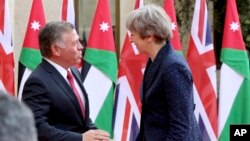Britain's prime minister pledged Thursday to step up economic support for Jordan, a key pro-Western Arab ally, amid concerns that the kingdom's mounting economic woes could undermine its stability.
Theresa May held talks with Jordan's King Abdullah II at the end of a three-day Mideast tour meant to bolster ties with the region before Britain leaves the European Union.
The meeting came at a time when May is embroiled in a social media row with President Donald Trump over his perceived stoking of anti-Islam sentiments.
Trump sparked outrage Wednesday when he retweeted inflammatory videos from a fringe British group purporting to show violence by Muslims.
May's office rebuked Trump, saying he was "wrong" to have done so. Trump countered that May should instead "focus on the destructive Radical Islamic Terrorism that is taking place within the United Kingdom."
Neither May nor Abdullah referred to the spat during brief comments at the start of their meeting in the Jordanian capital of Amman.
The king is a leading champion of religious tolerance and is viewed by the West as a crucial partner in the battle against Islamic militants.
May said the visit is an opportunity to expand current ties, which focus largely on security, and to "move that into a long-term relationship on the economy and economic development."
Abdullah said support from Britain to "strengthen our resilience of the economy will be very critical."
He added that "on political issues ... we're on the same page."
Jordan's stability is seen as a priority by Western allies who have expressed growing concern about the kingdom's economic problems.
Economic growth has been sluggish, in part because of the spillover from conflicts in neighboring Syria and Iraq, such as trade disruptions. Youth unemployment has risen above 30 percent.
At the same time, Jordan is under pressure to lower its public debt, and has undertaken painful reforms, including reductions in subsidies.
May's Mideast tour also included Saudi Arabia and Iraq.
In Riyadh she pressed Saudi's king and powerful crown prince to lift an air and sea blockade of war-torn Yemen, tightened after the launch of a missile by Yemeni rebels toward the Saudi capital earlier this month.
A Saudi-led coalition began its war in Yemen in March 2015 on behalf of Yemen's internationally recognized government against Shiite rebels known as Houthis and their allies. The conflict has pushed the Arab world's poorest country to the brink of famine.
May has faced increasing calls to stop British arms sales to Saudi Arabia. Britain has licensed over $6.1 billion worth of arms sales to the kingdom since the war began.




